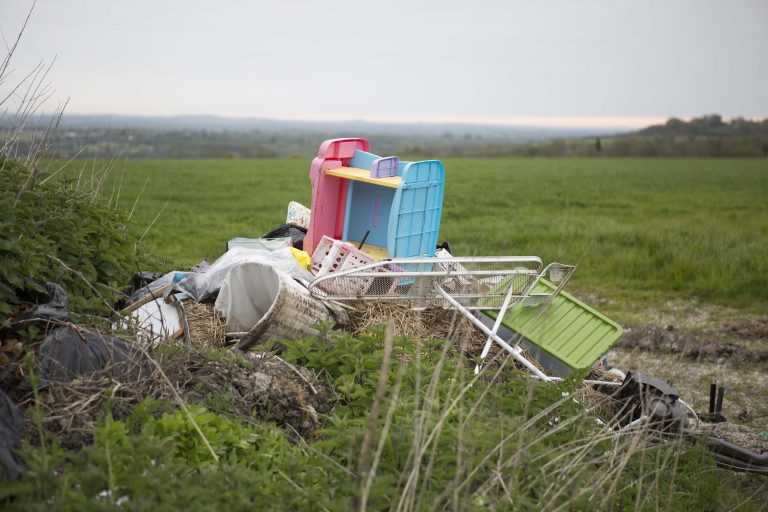Between April 2022 and March 2023, local authorities in England addressed 1.08 million fly-tipping incidents, which is a slight decrease of 1% compared to the 1.09 million cases reported in the previous year, according to Defra. It’s important to note that these figures are based solely on incidents on public land and exclude those on private or farmland.
Household waste constituted 60% of fly-tipping materials last year. In the 2022/23 period, there were 653,000 incidents involving household waste, slightly down from 671,000 in the 2021/22 period.
The majority of fly-tipping cases involved amounts typically fitting a ‘small van load’ (31%), with the next most common size being ‘a car boot or less’ (27%). There were 42,000 incidents, approximately 4% of the total, that involved larger quantities consistent with a ‘tipper lorry load’ or greater, marking a 13% increase from 37,000 incidents in the previous year.
Fly-tipping cover
In terms of insurance, you should discuss fly-tipping with your broker before taking out a policy. Some farm policies offer a small amount of cover as standard without any additional charge – typically only a few thousand pounds. But you could be faced with much higher clearance costs, especially for serious waste dumping offences.
More comprehensive farm and estate insurance policies are available, which can include, for example, up to £25,000 protection for fly-tipping as standard. This covers the cost of clearing up and removing any materials resulting from a waste dumping incident out of your control, including pollution, contamination, and environmental damage.
When to make a claim
Before making a claim, check who is responsible for the clear-up operation – this is dependent on where the fly-tipping occurred.
For small-scale fly-tipping on public land, including public highways where the rubbish might block a road or your farm entrance, local authorities are responsible for investigating, waste disposal, and taking appropriate enforcement action.
For larger-scale offences (more than a lorry load), hazardous waste or fly-tipping by organised gangs, in England the Environment Agency (EA) is responsible.
You’re only personally responsible for clearing fly-tipped waste if it occurs on your own private land, so that’s when to make an insurance claim, so long as you have the correct cover in place, of course.
It would be wise to report a fly-tipping incident if there’s potential to apprehend offenders or if there is hazardous or contaminated waste.
Ways to protect your farm
Rather than having to sort out a fly-tipping occurrence, it’s far better to prevent an unauthorised event in the first place, so here are some tips:
● Ensure gates remain closed and locked
● Block unused access routes and gateways
● Use WhatsApp to update employees and local businesses on suspicious activity
● Stay in touch with local police, especially if they have a rural team
● Install CCTV
If you fall victim to fly-tipping but can prove who is responsible, penalties include fines under the Environmental Protection Act, fixed penalty notices, and vehicle seizure. Householders can be fined up to £400 if they pass waste to an unlicensed waste carrier which is then fly-tipped.
Fly Tipping FAQs
Who is responsible for removing fly-tipping?
Local authorities are primarily responsible for removing fly-tipped waste on public land. If the waste is on private property, it is usually the responsibility of the property owner to arrange and pay for its removal.
How do you solve fly-tipping?
Solving fly-tipping involves a combination of enforcement, public education, and accessible legal waste disposal options. Local councils can install surveillance cameras in hotspots, impose fines, and prosecute offenders. Public awareness campaigns can inform people about the legal ways to dispose of waste and the consequences of illegal dumping.
What to do if someone dumps rubbish on your property?
If you find that someone has dumped rubbish on your property, you should report it to your local council. Do not touch the waste, as it may contain hazardous materials. The council can investigate and may remove the waste, especially if it poses a risk to public health.
What can I do if my neighbour is fly-tipping?
If you suspect your neighbour is fly-tipping, it’s best to avoid confronting them directly. Instead, report the incident to your local council. Provide as much detail as possible, such as the time of the incident, description of the person, and any vehicle involved, to help the authorities investigate.
Do I report fly-tipping to the police?
Fly-tipping should generally be reported to the local council rather than the police. However, if you witness fly-tipping in progress and believe it to be part of a larger criminal activity, or if it involves hazardous waste like chemicals, then it should also be reported to the police.
Is leaving rubbish outside your house fly-tipping?
Leaving rubbish outside your house can be considered fly-tipping if it’s not in accordance with local regulations for waste disposal. For example, if waste is left outside of designated bin collection times or in non-designated areas, it can be classified as fly-tipping. Always check with your local council for proper disposal times and methods.

